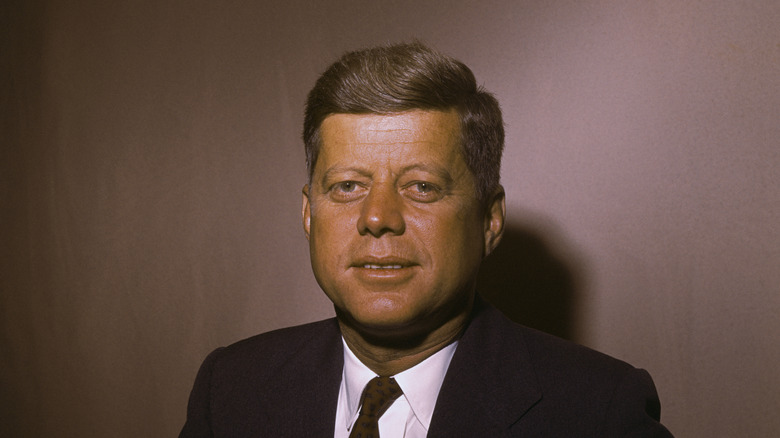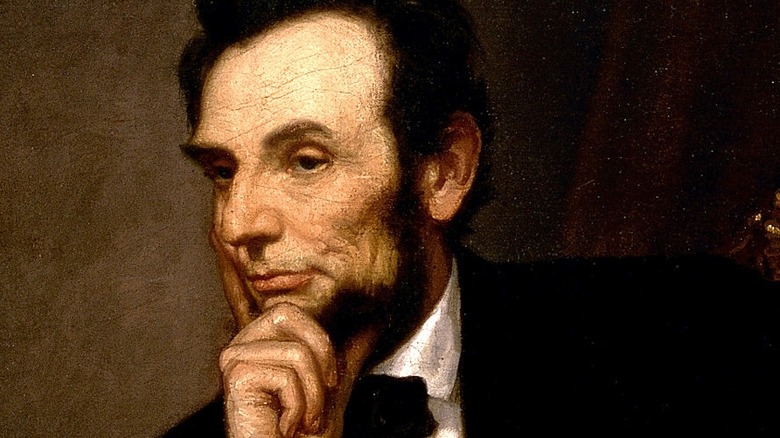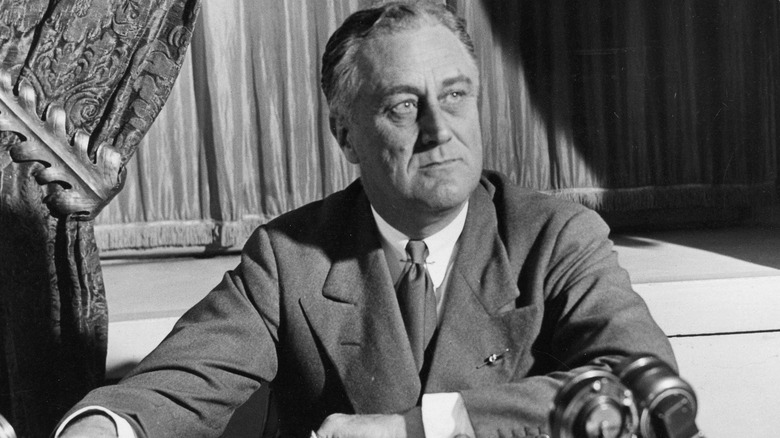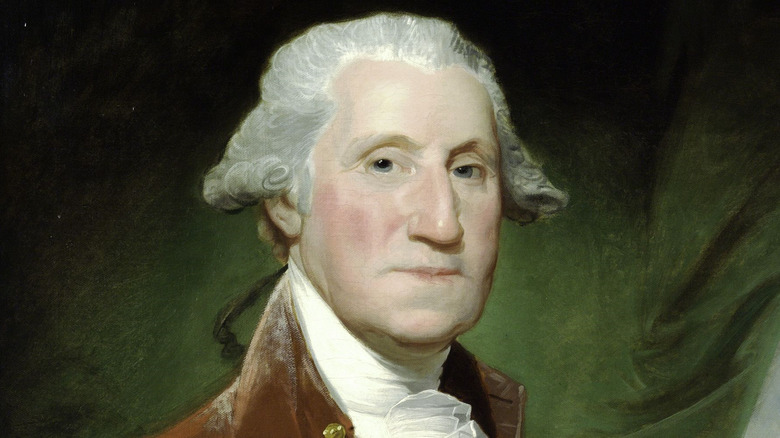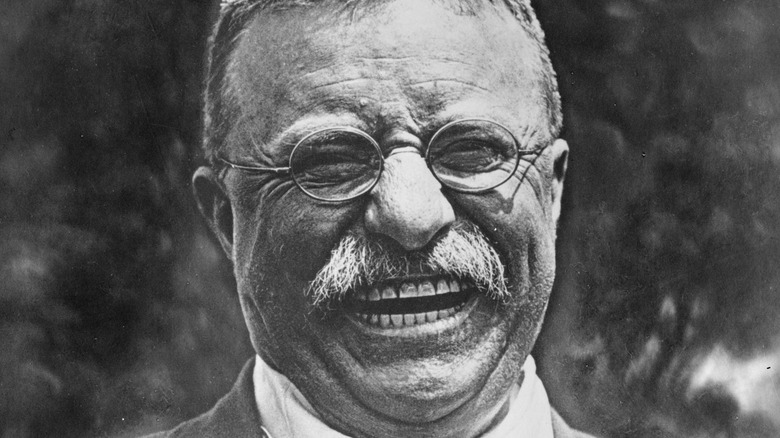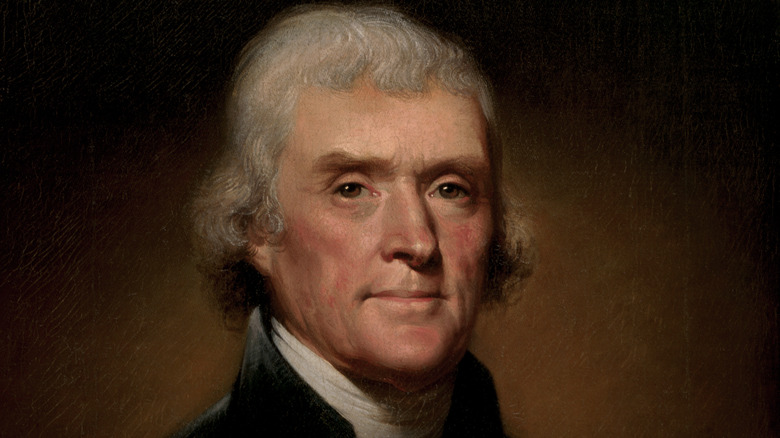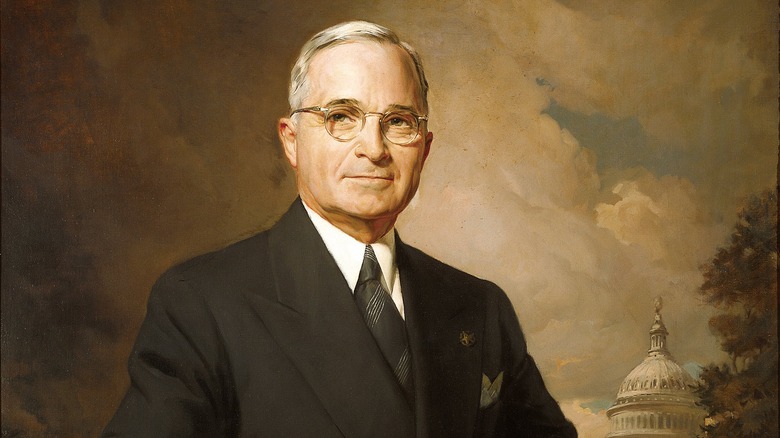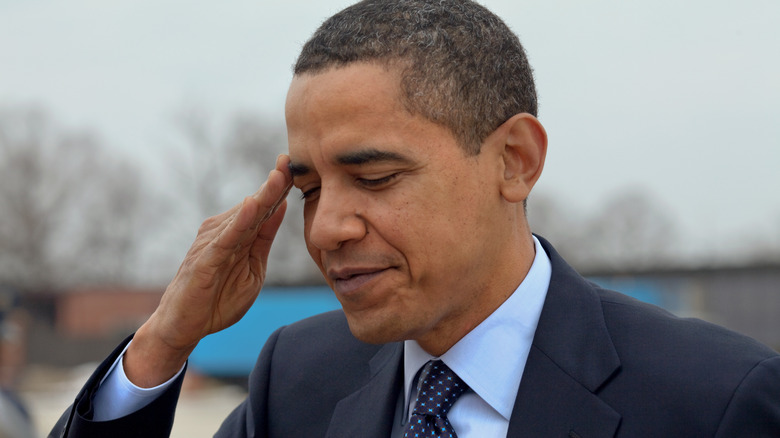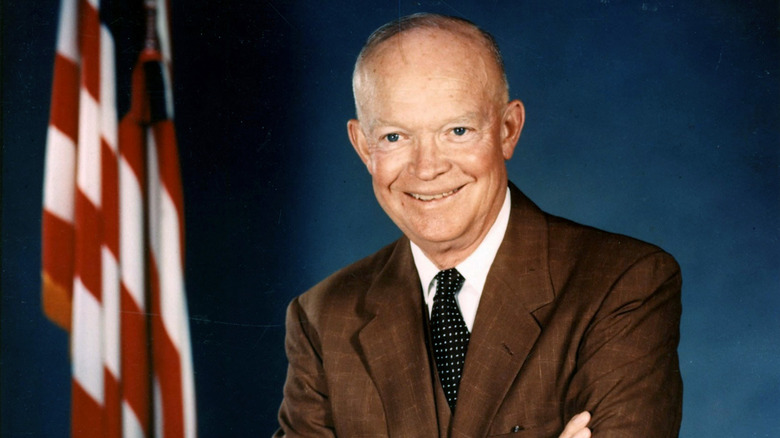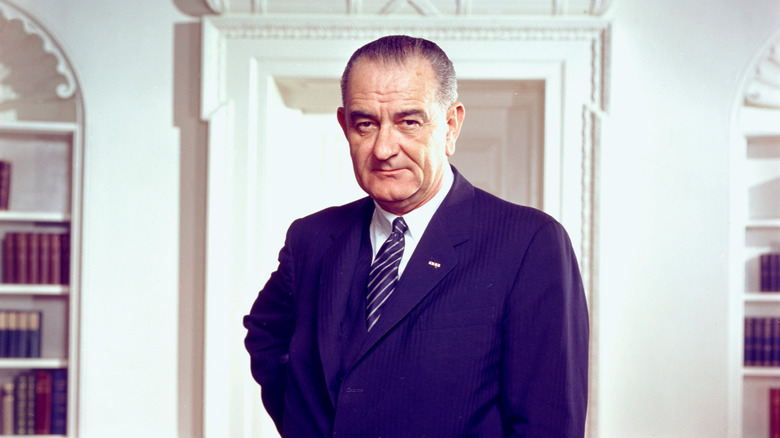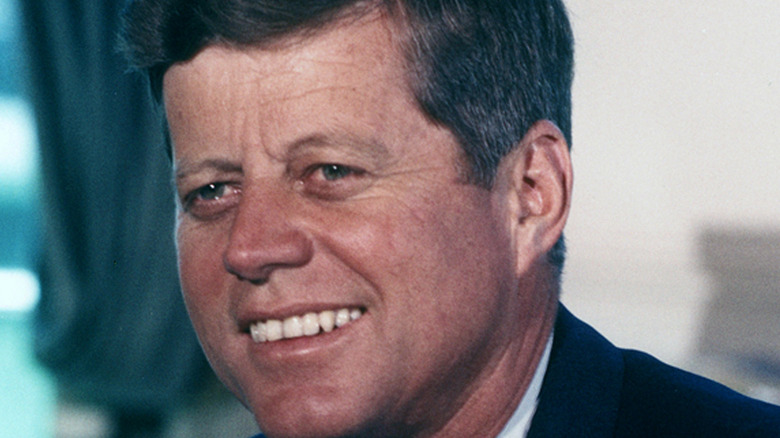Respected American Presidents Who Were Actually Terrible People
Each year around Presidents' Day, the public receives the results of polls that tally various historians' opinions of those who have served as commander-in-chief, ranking those presidents from best to worst. Certain presidents tend to haunt the same rough positions on the list from year to year, with the top three sometimes changing order, but rarely moving down in the ratings. The math would seem to suggest that those are America's greatest presidents.
But while their policies and any progress they brought about might be good on a broad scale, these people frequently possess various personal failings that might make you say "big yikes." After all, the kind of person willing to fight hard enough to become the so-called leader of the free world is probably the kind of person who would do whatever it takes to get what they want — be it power, wealth, romantic affairs, or whatever. Let's look at some of the more terrible facets of those we elected to the nation's highest office.
Abraham Lincoln
Abraham Lincoln is a pretty standard pick for first place in presidential greatness surveys, and it's basically unheard of for him to dip below the top three. As "Honest Abe," he is seen as a figure of integrity; as "the Great Emancipator," he is remembered for freeing the enslaved people of America, and as the "Savior of the Union," he is praised for doing the hard work of winning the Civil War and proving that American-style democracy wasn't a failed experiment. Both major American political parties proudly claim to be part of his political legacy.
However, despite much of his reputation being based on his ending enslavement in the U.S., in recent years, Lincoln's actual views toward Black people and Native Americans have become an increasingly hot topic of debate. It's known that in his personal life, Lincoln used racial slurs and told racist jokes, and he also attended minstrel shows. In his famous debates with Stephen Douglas, he said that white people are superior to other races, and Lincoln initially wanted freed enslaved people to be sent back to Africa to colonize Liberia, rather than integrate into American society.
It's important to note that Lincoln's views on race evolved over time, and it was in fact his support of voting rights for some Black men that pushed his assassin, John Wilkes Booth, over the edge. But his policies regarding Native Americans continued the harmful traditions of his predecessors, including forced removals and the seizure of Native lands for construction projects.
Franklin D Roosevelt
Franklin Delano Roosevelt is one of America's most respected presidents, primarily because of his leadership in shepherding the U.S. through the Great Depression and (most of) World War II, but also due to his implementing social programs to improve economic conditions for regular Americans. At the end of his presidency the U.S. was a superpower, and he is the only president to have been elected for more than two terms, being voted in a total of four times.
However, despite his reassuring demeanor and reputation for empathy, Roosevelt had a somewhat troubled personal life. FDR had a long-standing affair with his wife's social secretary, Lucy Mercer, which began well before his presidency and lasted until his death in 1945. When Eleanor Roosevelt found out about the affair, it strained their marriage, but they stayed together for political reasons (though Eleanor had extramarital relationships with women as well).
Probably the one of the biggest controversies from FDR's presidency was the forced internment of nearly 120,000 Japanese Americans during World War II, out of fear that they were collaborating with the Japanese army. Even FDR's wife urged him to rethink this cruel policy but at best got him to grant some work permits. Roosevelt was also known for antisemitism in his private life,
including helping institute a rule that limited the number of Jewish students that could be enrolled at Harvard, refusing the admittance of Jewish refugees in 1940 while dismissing all their "Jewish wailing," and bragging about his own lack of Jewish blood.
George Washington
As the first president of the United States, George Washington has earned immense respect not only for his personal qualities, but also for the precedents he established for the office, such as willingly relinquishing power after two terms. He was so associated with honesty and integrity that apocryphal stories about how he couldn't tell a lie grew up around him. The nation's capital is named after him and there's a giant obelisk to remind you of how cool he was. But despite all this, there are still some shady things about George Washington.
For one thing, George Washington enslaved people, as did many of the founding fathers. It might be easy to dismiss this by saying every rich white guy at the time was an enslaver, but Washington's successor John Adams wasn't and openly reproached his contemporaries who did, calling enslavement "an evil of colossal magnitude." Although it is true that Washington was the only enslaving president to free his enslaved people in his will, but his wife kept hers, and also, there's a decent chance Washington impregnated one of his enslaved people.
Furthermore, Washington's goals to establish the American nation on Native American land typically superseded any attempt at doing right by the Native American tribes who owned that land. If tribes refused his offers to purchase land, he would send troops to drive them off violently, to the extent that the Iroquois referred to him as the "Town Destroyer."
Theodore Roosevelt
Theodore Roosevelt has a reputation as America's most action hero-like president, thanks to the insane true story of Roosevelt's life, which included time as a cowboy, an outdoorsman, a hunter, a leader of a cavalry outfit called the Rough Riders, and surviving a bullet to the chest. He is also respected as a president because of his devotion to the pursuit of progressive ideals, such as economic and social justice for all Americans. Additionally, his enthusiasm as a naturalist helped lead to the creation of the National Park Service.
But there are some dark truths about Teddy Roosevelt hiding amongst his progressive politics. Roosevelt's famous "big stick" diplomacy approach to foreign policy was based on a firmly held belief in a racial hierarchy, with white people at the top. Many of the interventionist — and even imperialist — actions taken under the Roosevelt administration were based on the idea that territories such as Guam and the Philippines would be better off under the governance of white Americans, saying in his book "The Winning of the West": "[they] should pass out of the hands of their red, black, and yellow aboriginal owners, and become the heritage of the dominant world races."
Because Roosevelt believed in the superiority of the white race, he was also an ardent supporter of the now-repugnant eugenics movement, promoting the idea of only allowing people with desirable characteristics to reproduce, while those deemed inferior would be sterilized. Eugenics was, tragically, a fairly popular idea at the time, but it certainly doesn't sound like the "Square Deal" that Roosevelt famously promised all Americans.
Thomas Jefferson
At least as far as Mount Rushmore would indicate, Thomas Jefferson is one of America's top four presidents. Jefferson's presidency oversaw the Louisiana Purchase, which doubled the size of America's land holdings, but much of the rest of his reputation rests on things he wrote. As a scholar of considerable intelligence, Jefferson wrote doctrines and statutes that helped determine what American ideals of freedom would be. He is, of course, most known for writing the Declaration of Independence, in which he famously declared that all men are created equal.
However, despite the revolutionary idealism of these words, Jefferson was an enslaver and unlike Washington, Jefferson never made an effort to free those enslaved by him. Over the course of his lifetime, Jefferson enslaved over 600 people, with as many as 140 at any one time. One of the worst truths about Thomas Jefferson is that he had at least six children by an enslaved woman named Sally Hemings, and in such a relationship, it is impossible for the less-powerful person to truly consent. Furthermore, Jefferson is known to have lied and bribed people to try to keep this relationship a secret.
Additionally, Jefferson was a profligate spender in his personal life and pretty much always in debt. And, like many presidents, his record on relations with Native Americans was pretty bad. Jefferson could write elegantly about freedom and equality in the abstract, but in some areas, seemed incapable of instituting it in practice.
Harry Truman
Harry S. Truman inherited the presidency when Franklin Roosevelt died during his fourth term, and with it, the responsibility of guiding America through the end of World War II. At the time he left office, Truman was extremely unpopular, but after a while, his reputation began to rise with reflection on his foreign policy, sense of personal responsibility, and everyman persona. He was also responsible for one of the first major steps toward racial equality, by desegregating the military in 1948.
This executive order came as a surprise to many civil rights leaders, because Truman was known to have a dim view of Black Americans in his personal life, using slurs and telling racist jokes. His distaste for the civil rights movement became even more clear in the decades after his presidency, notably claiming that civil rights protests such as sit-ins were operations by communists, and saying that "[t]he Negro should behave himself." He opposed interracial marriage and criticized Martin Luther King, who asked Truman to apologize for his defamatory remarks and apparently received no reply.
On a more personal level, Truman was often petty and juvenile. He had a contentious relationship with General Douglas MacArthur and somewhat famously called the general "a dumb son of a b****" after firing him. He also threatened to beat up a music critic who gave his daughter's singing a bad review. And while still contested, to date he is the only world leader who has carried out a nuclear strike, on civilian targets, killing almost 250,000 Japanese civilians.
Barack Obama
Barack Obama is the most recent president to appear near the top of most presidential greatness polls, gaining respect for shepherding the U.S. out of a huge economic depression, instituting healthcare reform, and overseeing advancements in LGBTQ rights. He was a skilled communicator, and his presidency represented a new page in American history for many constituents.
Despite that, there were a number of questionable things about Barack Obama's presidency. In his first year in office, he was awarded a Nobel Peace Prize, presumably in anticipation of him making moves to undo some of the more aggressive policies of his predecessor. However, Obama would go on to authorize nearly 600 drone strikes that killed almost 4,000 people during his time in office, way more than George W. Bush had approved. One such strike hit a funeral in Pakistan, causing the death of 41 civilians. He also authorized drone strikes against medical personnel and other first responders to keep them from helping any survivors from a previous drone strike. Attacks against medical personnel are against the Geneva Conventions, arguably making Obama a war criminal.
His overall record on human rights was generally poor as well, as he never closed the military prison at Guantanamo Bay despite promises to do so, and he did nothing to stop CIA torture programs. He expanded surveillance systems instituted by the previous administration, and his ill-advised response to atrocities in Syria caused many to feel that the hope for improved foreign relations that the Peace Prize seemed to dream of would go unfulfilled.
Dwight D. Eisenhower
Dwight D. Eisenhower gained an impressive reputation in the U.S. even before his presidency thanks to his military career, in which he served as the Allied commander in World War II and planned the invasion of Normandy on D-Day. But in recent years he has gained respect as a president due to his policies that kept America from war, even as Cold War tensions increased, and allowed economic growth to reach record highs. He is also lauded for his record on civil rights and actions, such as sending troops to make sure that schools were desegregating like the Supreme Court said they should.
However, Eisenhower had a legendary temper, getting angry at even small things, like someone making a bad play in a card game. He was known as "the terrible-tempered Mr. Bang" among his staff for his tendency to blow up at even the littlest thing. He was aware of this problem, though, and had been since childhood. He took steps to try to curb his temper, like writing down the names of people who upset him and putting them in a drawer. Despite such measures, he would scream at anyone who mentioned Joseph McCarthy — and ordered squirrels shot when they dug holes on his putting green.
There are also rumors that Eisenhower may have had an affair with his driver during the war, Kay Summersby. Both Eisenhower and his wife Mamie denied these rumors, however, and there is no evidence that the close relationship between Eisenhower and Summersby was anything other than platonic.
Lyndon B. Johnson
Lyndon B. Johnson became president after John F. Kennedy was assassinated, but he had a long political career beforehand and managed to accomplish quite a bit during his time in the White House. During his term of office, he oversaw the creation of Medicare and Medicaid and introduced a number of social programs as part of his Great Society initiative, including food stamps and Head Start. He also passed a lot of civil rights legislation, including laws related to voting rights, education, and fair housing.
That said, Johnson was famously a brash and crude individual. He called his own, ahem, male member "Jumbo," and would wag it around at anyone he thought might look at it, hooting and hollering about how big it was. He was also known to use uncouth and graphic language in public and political situations in a way that's not common for presidents. While foul language might be no big deal for some, Johnson was also said to be cruel and vicious in his pursuit of grandeur for himself. He considered fellow Democrats who opposed his policies on Vietnam to be traitors, and possibly under communist influence.
Johnson was also a great lover of women (among other vices) and carried out an affair with a woman named Alice Glass for decades. Johnson's wife Lady Bird knew about Glass and Johnson's other affairs, but Johnson callously disregarded how his wife might feel about them, instead bragging that he'd slept with even more women than JFK.
John F. Kennedy
As one of the youngest presidents in American history, John F. Kennedy cut a more dynamic figure than many of his older predecessors, and he and his beautiful young wife brought a kind of celebrity glamor to the White House unlike anything seen before. He was charismatic and charming and a skilled speaker, and his statesmanship helped overcome his youthful inexperience as he steered through dicey foreign relations and worked to advance civil rights initiatives.
However, the same charm and charisma that made him an effective communicator also made him an unrepentant flirt. It's no secret that Kennedy was a prolific womanizer, and he engaged in a wide range of affairs, including with a 19-year-old intern, a friend of his wife's, secretaries, actresses, and expensive sex workers. Of course, his most famous paramour is alleged to have been Marilyn Monroe, but there's no evidence the two actually slept together. That said, Kennedy's wife Jackie was fully aware of his extracurricular activities, but knew it was just something she would have to deal with. To keep the public out of the loop, however, Kennedy used the Secret Service to keep reporters out of his personal business, sometimes even with physical violence.
Having grown up in a house full of brothers, Kennedy also exhibited a number of other hypermasculine traits, including being extremely competitive and often controlling in his relationships with others. His wealthy upbringing also led to him thinking of himself as immune to the rules and that he could get away with anything.
